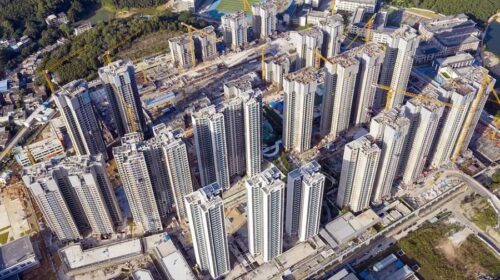Fourth time lucky? Shum Yip Property files new IPO application

A successful Hong Kong listing for the property manager could reflect growing confidence in a long-awaited recovery for China’s ailing real estate market
Key Takeaways:
- Shum Yip Property has filed a fourth time to list in Hong Kong, ranking ninth among all Chinese property managers
- The company reported 1.41 billion yuan in revenue during the first half of the year, while its profit rose 12.6% to 92.3 million yuan
By Lee Shih Ta
Listing is never easy, even when you’re a state-owned company with the powerful Shenzhen government as your backer. Shum Yip Property Operations Group Co. Ltd. has learned that lesson the hard way, making its fourth application for a Hong Kong IPO earlier this month as it hopes to catch a ride on a recent wave of positive sentiment towards new listings.
Founded in July 1992 in the Southern boomtown of Shenzhen, Shum Yip is a relative old timer on China’s property management scene with more than three decades of experience. Its parent, the Shenzhen government-owned Shum Yip Group, was founded even earlier in 1983 and counts other units like Shenzhen Investment (0604.HK) and Shahe Industrial (000014.SZ) among its listed assets.
Shum Yip Property provides property management, commercial operational and city services in China, with 498 such properties under management in 46 cities across China as of June, according to its listing document. It focuses on Guangdong province’s Greater Bay Area, which includes Hong Kong, Macau, Shenzhen and Guangzhou, and accounts for 60.2 million square meters of its gross floor area under management, or 67.5% of its total.
The company ranked ninth among comprehensive property management companies in China last year, accounting for 0.3% of the market. In the first half of 2024, its operating revenue reached 1.41 billion yuan ($198 million), up 9.8% year-on-year, while its profit rose 12.6% to 92.3 million yuan.
The company first applied to list in Hong Kong in February last year. It reapplied again six months later after the initial application expired without a listing. Its application was officially registered with the Chinese securities regulator in February this year, and it made its third Hong Kong application a month later but failed to pass its listing hearing.
Best listing window missed
Shum Yip Property is actually a bit late to the listing game within its industry. A wave of IPOs began around 2018 as developers split off their property management arms to give investors clearer choices among the two different business models. The number of Chinese property managers listing in Hong Kong surged from eight in 2019 to 18 in 2020, followed by 13 in 2021. But then the number dropped to six in 2022, and just two listed last year.
Only two other small companies from the group have managed to list so far this year, Hollwin Urban Operation Service (2529.HK) and Kingfar Property (1354.HK).
The drop-off in listings is a direct result of China’s sagging property market, which could easily cast a damper on Shum Yip’s parade if the company makes it to market this time. At such a time of low confidence, a company’s profitability matters more than ever.
Shum Yip has size in its favor, as it’s several times bigger than Hollwin and Kingfar. The company’s revenue has been rising the last three years, going from 2.15 billion yuan in 2021 to 2.71 billion yuan last year. By comparison, Hollwin’s revenue rose from 430 million yuan to 650 million yuan over that period, and Kingfar’s grew from 590 million yuan to 860 million yuan.
But in terms of profitability, Shum Yip lags behind the smaller Hollwin, which is also state-owned. Hollwin’s gross margin has hovered between 25% and 23% over the last three years, well ahead of Shum Yip’s margins in the 13% to 16% range.
The margin gap between the pair might be related to their specific businesses. Shum Yip’s scope includes management services for city and industrial parks, as well as residential and commercial properties. The first two categories make up a high percentage of Shum Yip’s revenue but are less profitable, with gross margins of just 13.4% and 10.3%, respectively, in the first half of the year. Its commercial management services category is much more profitable, with a gross margin of 27.3% in the first half of the year. But that business accounted for less than 24% of the company’s revenue during the period.
Reducing related-party dependence
Like many of China’s real estate management spinoffs, Shum Yip relies heavily on affiliated companies for its profits. Its gross margin for services provided to affiliated companies ranged between 21.6% and 23.9% over the last three years, roughly triple the range of 6.4% to 8.9% for independent third-party companies.
The company has been trying to reduce its dependence on related parties in order to get listed. Related parties as a share of its business, based on gross floor area under management, fell from 27.4% in 2021 to 20.8% in late June this year. But its share of revenue from third-party companies did not come up during that period, and actually fell from 56.6% in 2021 to 54.5% in the first half year of 2024.
Shum Yip’s growing pile of receivables is also a concern. In the first half of the year, its losses from financial asset depreciation totaled 13.7 million yuan, more than quadruple the previous year, as a result of an increase in trade receivables. Its outstanding receivables totaled around 630 million yuan at the end of June, some 35% of that associated with related parties and the rest from third parties. The turnover period for its related-party receivables was also quite long at 284.2 days, compared with 59.5 days for third-party companies.
The clock is ticking on Shum Yip’s latest application, as its registration with the Chinese securities regulator will expire in four months. Shum Yip also adds that its listing will have to be accomplished by next year, as it aims to become the first publicly listed property management company controlled by state capital with operating revenue exceeding 6 billion yuan during China’s 14th Five Year plan that runs from 2021 to 2025. So, the pressure is on.
China’s property market is showing signs of stabilizing lately thanks to policy support from the central government, meaning the property management sector that is suffering relatively less than developers might be poised for a rally. Shum Yip Property would certainly benefit from such a rally, which could reflect recovering confidence in the beaten-down sector. But first it will need to clear the IPO process in its fourth – and what it hopes will be final – attempt.
To subscribe to Bamboo Works free weekly newsletter, click here






